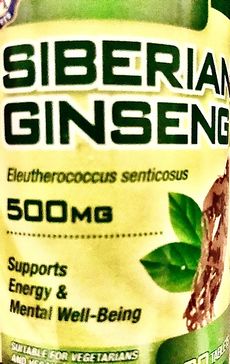Eleuthero
From MEpedia, a crowd-sourced encyclopedia of ME and CFS science and history

Eleuthero, also know as Siberian Ginseng, eleutherococcus root or eleutherococcus radix is a herb frequently used in traditional Chinese medicine.[1][2][3] It's species name is Eleutherococcus senticosus.[3]
Alternative names[edit | edit source]
Ciwujia
Uses[edit | edit source]
Eleuthero is a member of a small woody shrub that grows in mountain forests and is native to eastern Asia including China, Japan, and Russia. Traditional Chinese medicine uses eleutherococcus for reducing lethargy, fatigue, and low stamina as well as increasing endurance and resilience to environmental stresses.[4] It is believed to improve the immune system.[5] It is considered an adaptogen.[citation needed]
Alternative name[edit | edit source]
Theory[edit | edit source]
Evidence[edit | edit source]
Clinicians[edit | edit source]
Risks and side effects[edit | edit source]
Costs and availability[edit | edit source]
See also[edit | edit source]
- Adaptive immune system
- List of approved herbal medicines by the EU Committee for Herbal Medicinal Products
- Herbs (category)
Learn more[edit | edit source]
- Natural products (pro) - drugs.com
- Natural products (consumer) - drugs.com
- Eleutherococcus radix - European Medicines Agency
References[edit | edit source]
- ↑ "Siberian ginseng Uses, Benefits & Dosage - Drugs.com Herbal Database". Drugs.com. Retrieved July 30, 2020.
- ↑ "Eleutherococcus Uses, Benefits & Side Effects - Drugs.com Herbal Database". Drugs.com. Retrieved July 30, 2020.
- ↑ 3.0 3.1 "Eleutherococcus radix". European Medicines Agency. Retrieved August 23, 2020.
- ↑ "Siberian Ginseng". DrWeil.com. August 4, 2016. Retrieved July 30, 2020.
- ↑ "Health Benefits of Ginseng Eleuthero". Dr. Edward Group's Healthy Living Articles. September 22, 2015. Retrieved July 30, 2020.

